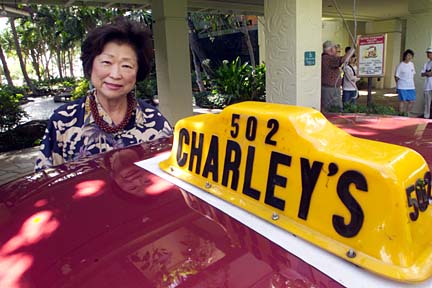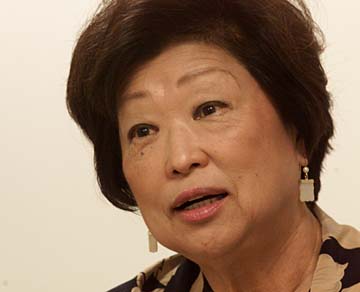

|
First Sunday Mark Coleman |
FL MORRIS / FMORRIS@STARBULLETIN.COM
Charley's Taxi president Dale Evans has one of Hawaii's oldest taxi driver's licenses. She earned hers in 1957 so she could help with the family business.
Dale Evans of Honolulu might not be "Queen of the Cowgirls" like her famous namesake was, but she certainly is Hawaii's "Queen of the Taxicab Drivers."Evans has been involved in every facet of the taxi business for more than 35 years, rising through the ranks of Charley's Taxi, which her parents started in 1938, to become its president and general manager. She succeeded her mother, Helen Morita, and coming up behind her in the business is her daughter, Darcianne.
The family affair is Hawaii's oldest taxi and ground transportation company as well as its second largest, with more than 200 radio-dispatched taxis and about 300 drivers. Through the years, thousands of people have driven cabs under the Charley's Taxi banner.
Besides regular taxi service, Charley's offers limousine service, a one-of-a-kind Japanese-language dispatch service for visitors from Japan and an innovative service called Medicab, which provides escorted service for elderly and handicapped customers who need rides to their doctors' appointments.
Being on the cutting edge of the transportation business hasn't been without cost: Evans has spent many hours butting heads with politicians and bureaucrats who think they know best how to operate her business. She has hired lawyers, testified at hearings and lobbied for greater freedom for the taxi business, which is burdened by a surprising amount of regulations at both the city and state levels.
Active in numerous associations and volunteer activities, Evans is a 1956 graduate of Roosevelt High School. She also earned a bachelor's degree in business administration and political science from the University of Oregon.
If you need a ride somewhere, just give her a call.
FL MORRIS / FMORRIS@STARBULLETIN.COM
"I think the accepted practice in the industry is to treat the taxi driver as the lowest form of labor." --Dale Evans, President and general manager, Charley's Taxi
The daily quota
Mark Coleman: So, what was it like being married to Roy Rogers?Dale Evans: (Laughs)
MC: Nah, just kidding.
DE: You're showing me your age. And you're my quota for today.
MC: You get that, what, once a day or something?
DE: Well, the thing is, the young people don't remember her (Dale Evans, the singer and actress who was married to cowboy star Roy Rogers), so it's just the older people who used to watch "The Roy Rogers Show."
Working at Charley's
MC: How did you get started working for Charley's Taxi?DE: I've been in the business actively for over 35 years. Even before I went to college, after school I used to go down and help my mother answer telephones and do the billing. And then in 1957, after my first year of college, I drove a taxi. I bet you I might have one of the oldest licenses.
MC: Why is the company named Charley's?
DE: That was my dad's name.
MC: Is your dad still alive?
DE: He died in '85.
MC: Was he active in the company until then?
DE: Actually, my parents (Charles and Helen Morita) got divorced in 1957. Then my mother took over the business.
MC: Is your mother still involved in the company?
DE: She was until recently. She's a little under the weather right now. She's going to be 90 this year.
MC: So how does Charley's stand in relation to some of the other taxi companies?
DE: We're not the biggest, but we're the best.
MC: (Laughs) I know some people who used to be cab drivers.
DE: We have some very interesting alumnae who used to work at Charley's.
MC: Like who?
DE: There was Al Michaels, who is now a sportscaster; Steven Alm, the former U.S. attorney and now a judge. We had the chief of TIG Insurance, Wayne Hikida; Sidney Ayabe, former president of the Hawaii State Bar Association; and Roger Morton, senior vice president of Oahu Transportation Services. So it's an honest way to make a living and pay for whatever interests you have.
The politics of taxis
MC: What are some of the issues facing your business today? When I first became aware of you and your mother, in the '80s, the main discussion, I think, was about eliminating the limit on the number of cabs in Honolulu. There could only be 1,300 or something like that?DE: We fought that battle two or three times at least.
MC: How did it get repealed?
DE: Well, we hired Wayne Pitluck's law office -- Robert Miller, who used to be in the (state) antitrust division -- and we asked him to submit an opinion letter to Gary Slovin, the city's corporation counsel. Slovin then wrote his own opinion that it was unlawful.
MC: Do you remember what his reasoning was?
DE: Yeah. It was a restraint of trade. So now (since the early '80s), Honolulu is one of the few open-entry cities (for taxicabs) in the United States.
MC: I heard that taxi drivers can be fined up to $1,000 by the city and $1,600 by the PUC (state Public Utilities Commission) for the smallest of infractions.
DE: Yes.
MC: Do they levy these fines frequently?
DE: Yes. That's why the drivers are so intimidated.
MC: Why do you think government officials are so draconian on taxicabs?
DE: I think the accepted practice in the industry is to treat the taxi driver as the lowest form of labor. They look down on them. It's amazing to me. Like at the PUC, the way they look at it is like, how do you control juvenile delinquents? But we are business people. We're doing business with international corporations. When you hear them, they think they know how the business works. They have no idea. The fact is, Honolulu's taxicab industry is regulated the most, it's burdened the heaviest in service responsibility, it has price ceilings, it faces restricted access to lanes and zones accorded to transit and PUC operators, and it's vulnerable to unfair competition from the heavily subsidized public-transit system.
MC: Don't some of the laws have some rationale -- public safety, for example?
DE: Right. Accountability, that's fine. But I think a main reason for all these laws against taxicabs is that they are trying to protect the transit monopoly.
MC: You're talking about TheBus?
DE: Not only TheBus.
MC: What else?
DE: The HandiVan (a city service for elderly and handicapped riders). Now, Mark, in all of these years, in addition to operating the business, I've been a student of transportation, and as far as I am concerned, all modes of transit have their place. My perception is that there's more than enough business. However, since the city has come into the business, they not only manage the system, they not only develop and enforce the laws -- and that means traffic, access, licensing, fees -- they actually have gone into taking over routes that are established private routes and then they're subsidizing them to the effect that they are not managers, they're players, they're competitors, so they don't look at the market fairly. There's no balance.
Taking a stand
MC: Does it take courage to stand up and say stuff like this? I mean, you've testified at the City Council, you've offered your views. Is there a way for them to retaliate?DE: I think the (city) administration does retaliate, because there are restraints on us that I think are unlawful, but they continue to insist that we have to abide by them, like the sign law (which prohibits trade advertising on taxicabs). I think the sign law has been ruled unconstitutional (in Beetleboards of America Inc. vs. The City & County of Honolulu, 1980).
MC: So why don't you get an attorney and push that one?
DE: I did, but in the meantime I have been going through what they call the Small Business Regulatory Review Board. During the Cayetano administration, there was this Small Business Regulatory Relief Act, so I've been trying to make the transportation issue be living proof that it actually can work.
The price isn't right
MC: What about price-fixing? Why do you think they think they have a right to fix taxicab rates?DE: I really believe that it's because it's just accepted practice. They think they are entitled to do it, just because. But to me, in order to regulate, like a utility, there's supposed to be a trade.
MC: Like Hawaiian Electric. In exchange for the monopoly, they submit to rate regulation.
DE: Yes.
MC: But you guys aren't a monopoly. You are all competing against each other and other transportation providers.
DE: Not only that, but they think they can make the taxi drivers operate below minimum wage. They impose taxes and fees -- like the $4 fee to pick up people at the airport. The taxi driver, who isn't allowed to refuse the load, can't pass that on the customer. So if a taxi driver takes a fare from the airport to Salt Lake, that's maybe a $5 or $6 trip. He pays $4 for the fee, and so he makes a dollar for the trip. Now, to me, that's involuntary servitude. The taxi driver should be able to pass on the user fee, like they do everywhere else.
The lesson of the strike
MC: What do you think about the strike they just had with TheBus?DE: I've seen three to five strikes here and on the mainland, where I actually have lived or visited. What I've learned is that transit can go out and within a couple of days, people adjust. But the real problem was the elderly and the disabled. To what extent are you going to isolate them and hold them hostage, because they're the ones who are going to scream the most, and that's what happened. This is the problem with having a monopoly. The whole public is at their mercy. I really believe that the politicians are responsible.
Who says it's rapid?
MC: Are you an opponent of the rail-transit idea?DE: Yes.
MC: And you're also on record as being opposed to the Bus Rapid Transit idea, right?
DE: We are opposed to the in-town portion of the proposed BRT.
MC: Why?
DE: I was on the first rail coalition with John Hirten (city transportation direction under Mayor Frank Fasi), because when you're in the transportation business, you recognize that all modes have their place. But the problem with Honolulu is that we have a very small population base. So in order to be able to afford these very expensive systems, you have to realize that somebody's got to pay for it. Another problem is that maximum ridership for Honolulu is possible only within a certain corridor, which is our apartment zone from Moiliili to Salt Lake. Outside that, people live in hills and valleys. They live in a country environment. Buses are unsuitable for those low-density neighborhoods. Also, buses are inefficient because they cost $85 to $110 an hour.
MC: What's your gripe against the BRT?
DE: I really feel that this is the most dangerous, disruptive and inefficient project that the city has most recently come up with. I also feel that it is discriminatory against the people who are most in need of access to transportation, and that's the elderly and the disabled. They are not able to use TheBus, because they are too frail. They use the Handi-Van, but that service is so intolerable.
The ideal situation
MC: So the ideal situation locally would be what?DE: Allow participation by all interested providers and have a user subsidy. That would reduce the cost to the taxpayers and free up the users so they could go find alternatives.
MC: A user subsidy is like a voucher?
DE: Right.
MC: So people in need, whom they're subsidizing right now on TheBus or The Handi-Van, could get an annual allotment, for example, from an agency that they could trade to taxicabs or whatever for travel?
DE: Right. The users could use whoever they wanted. And one of the things I've learned in this business is that the consumer is smarter than the operators. They will figure out very quickly how they can make it cheaper for themselves.
With friends like these
MC: Who would be sympathetic in the Legislature these days to your views?DE: There are people who are a little bit enlightened. However, politically, there's always this thing of, "Oh, who's against it?" That's always the first thing they ask you: "Oh, who's against you?"
MC: (Laughs) And then they decide if they want to be for you or not? That's interesting. And the City Council members -- what's their attitude toward all this?
DE: The problem with the City Council and the neighborhood boards is they've gotten into so much of the nitty gritty that they have lost sight of what the core and the policies should be. Unfortunately.
See the Columnists section for some past articles.
Mark Coleman's conversations with people who have had an impact on our community appear on the first Sunday of every month. If you have a comment or suggestion, please send it to mcoleman@starbulletin.com.


